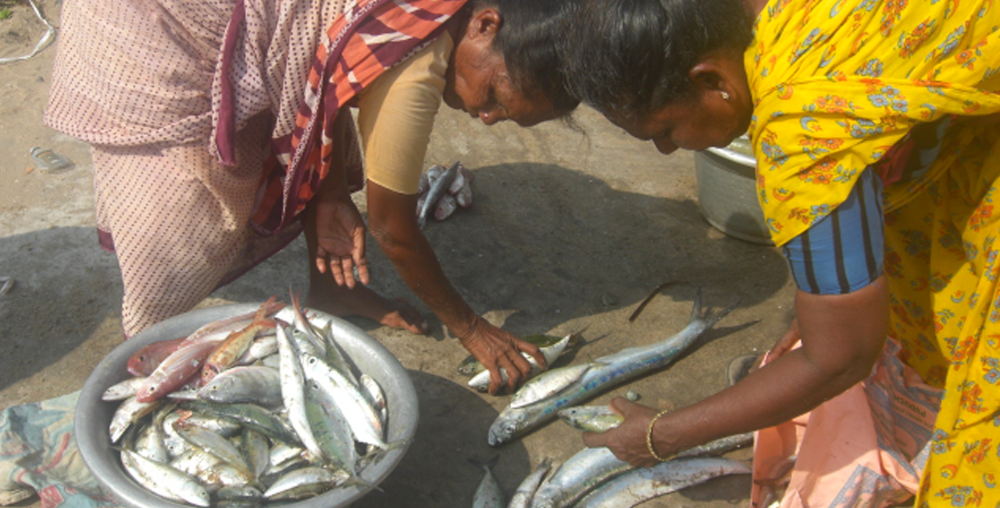FishAsia
Migration and collectives/networks as pathways out of poverty. Gendered vulnerabilities and capabilities amongst poor fishing communities in Asia

Through quantitative and qualitative methods this projects seeks to solicit the aspirations, social divisions and gendered livelihood pathways of fishers in each study area to explain wider issues of well-being.
Project objectives and methodology
The project leader, principal investigators, and local partners of this project have worked extensively in the field of gender, migration and rural livelihoods. Fishing communities across Asia are undergoing rapid socio-cultural changes caused by changes taking place at political, environmental, and technological levels. These changes have different impacts on different people within the fishing communities. However, presently we know less about how these processes interact with and become part of the everyday life of fishers in Asia, including the seemingly increased reliance for coastal and inland fishers on migration for work and marriage for making ends meet. The present project seeks to remedy this gap, by looking into situations in which migration becomes a potential route out of poverty for women and men in fishing communities in Cambodia, Sri Lanka and two states of India. We do so by identifying disabling (vulnerabilities) and enabling (capabilities) conditions, leading households to stay in or exit out of poverty. Fishing communities in these countries are amongst the poorest, most vulnerable and socially excluded. Methodologically, this project combines quantitative information (statistics and survey data) with qualitative methods (interviews, focus group discussions and life histories). The project development and results are continuously discussed in dialogue with local partners, whose interests it is to develop empirically informed policies and actions with respect fishers who live in vulnerable situations. Outcomes of the project will be three country studies, some sub-studies by PhD and postdoctoral fellows, and a synthesis paper.
The research aims to generate an innovative, gendered analysis of economic, social and subjective dimensions of poverty and wellbeing in fishing communities and how internal and external migration are responses to a range of environmental (resource depletion, seasonality, natural disasters, climate variability) and political-economic (market, state/policy, conflict) changes. Subsidiary objectives of the project are to 1) examine the efficacy of migration/mobility as a potential strategy helping poor households in fishing communities in Cambodia, India and Sri Lanka to exit poverty and improve wellbeing outcomes, 2) to explore the role played by social networks and collective action in facilitating migration and alleviating poverty among fishers, and 3) to analyze the adequacy of existing national policies relating to migration, fisheries management and rural development in addressing gender needs and capabilities. While the research comprises basic quantitative research in Sri Lanka, where 800 households have been interviewed, the project teams in India and Cambodia are fortunate to have access to reliable national surveys on livelihoods, poverty and fishing. Meanwhile, through fieldwork and qualitative research the project members solicit the aspirations, social divisions and gendered livelihood pathways of fishers in each of the study communities to assess and discuss wider issues of well-being.
Often one of a portfolio of livelihoods, fishing is affected by a range of environmental (resource depletion, seasonality, natural disasters, climate variability) and political-economic (market, state/policy, conflict) dynamics, which fishing households respond to by participating in internal seasonal labour migration or international labour migration. Migration and mobility as livelihood strategies can include households moving to better fishing grounds seasonally, moving away from fishing/aquaculture by accessing alternative livelihoods, moving into fishing seasonally from agriculture, or subsidizing fishing/aquaculture activities through remittances. The economic costs and benefits to women and men from this migration process are better known than the social/relational and subjective gains and losses.
A fuller understanding of the differentiated experience of poverty and inequality of women and men, their strategies for making a living, including the role of fishing within a diversified livelihood portfolio, as well as their aspirations for future stability and growth, can provide a deeper understanding of migration and mobility as potential pathways out of poverty. The research will also explore the relationship between resource conflicts, migration and poverty in fishing communities, focusing on ongoing and post-war vulnerabilities.
Principal Investigator: Kyoko Kusakabe, Asian Institute of Technology
Principal Investigator: Nitya Rao, University of East Anglia
Principal Investigator: Nireka Weeratunge, International Center for Ethnic Studies (ICES)
Local Partner Institutions: ICES, Colombo; Cambodia Institute for Research and Development, Phnom Penh; Fisheries Management Resource Centre, Trivandrum
